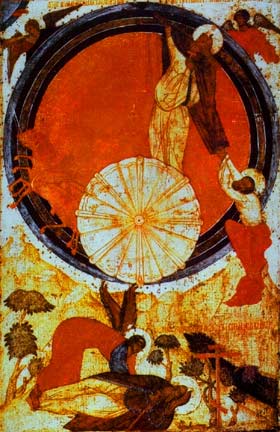|
The story is very apt and fits in with Jesus' general diagnosis
of the problem with the Pharisees. There is nothing intrinsically impossible about Jesus, the living
God incarnate, quoting from Aesop's Fables; not only did the Rabbis of the
Talmud do so, but even many of the preachers He
commissioned and sent out into the world do so, to this day. Or can it be
that the one thing the living God cannot do, is quote? Why not? This is the
underlying assumption of parallel-o-mania: "His [Bultmann's] basic
assumption that parallels point to non-authenticity." (A Shorter
Life of Christ, by Donald Guthrie, p. 44). They assume, if Aesop
said it, Jesus cannot have said it, which is strange when you think about it. Does that go for everything,
like 'The sky is blue'? In any event, the saying, as a dominical
saying, is not attested anywhere else, and 'Thomas' is
not generally a reliable source.
Margaret Barker has made a name for herself by discovering 'The
Lady,' a goddess, in ancient Israel's religion. This party turns up
everywhere; for instance,
"Enoch preserves a short poem about rejecting her.
When she found no place to dwell on earth:
'Wisdom returned to her place
And took her seat among the angels.
Unrighteousness went forth from her chambers;
Whom she sought
not, she found,
And dwelt with them. . . '"
(Barker, Margaret.
King of the Jews: Temple Theology in John's Gospel (Kindle
Locations 4749-4754).)
Wow, authentic Jewish teaching about the goddess! Except where have
we heard it before? It's just Themis, or Nemesis, or whoever is your
goddess of wisdom, departing from unrighteous mortals, her place taken
by an unsavory sister: "Envy will
be everybody's constant companion, With her foul mouth and hateful face,
relishing evil. And then up to Olympos from the wide-pathed Earth,
lovely apparitions wrapped in white veils, off to join the Immortals,
abandoning humans There go Shame and Nemesis. And horrible suffering
Will be left for mortal men, and no defense against evil." (Hesiod,
Works & Days, 227-233, p. 29, translated by Stanley Lombardo). It's a
standard pagan riff; when Wisdom, or Justice, finds no place to dwell
among men, she returns to her heavenly home.
Sometimes there is a synergy between God's viewpoint and some
previously expressed human view, such as Cato the Elder's disdain of
women's ornaments:
"And on this subject Cato delivered a speech in which he
made out that the law ought to prevail, and finally he added these
words: 'Let the women, then, be adorned not with gold nor precious
stones nor with any bright and transparent clothing, but with
modesty, with love of husband, love of children, persuasion,
moderation, with the established laws, with our arms, our victories,
our trophies.'" (Cassius Dio, Roman History, Book 18, Fragment IX,
17.)
Where there is such synergy, it's worth noting, but there's no
reason to find it here. It always surprises me that the 'Jesus Seminar'-types are willing
to accept 'Thomas;' they even champion and celebrate it. In so doing they
are giving away the store. The Gospel of Thomas reports Jesus as
having told the story of the Vineyard, which makes clear that He is
the Son of God, not in the sense in which any random human being, or any
random Israelite, might be called a son of God, but in a unique sense. He
is the heir:
|



